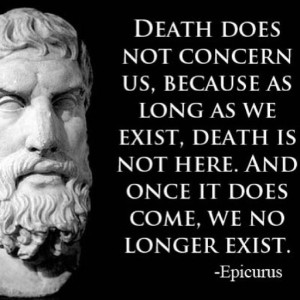 Epicurus claims that there are two self-imposed beliefs that do the most to make our lives unhappy or full of pain. They are first, the belief that we will be punished by the gods for our bad actions, and second, that death is something to be feared. Both of these beliefs produce fear and anxiety, and are completely unnecessary since they are based on fictions. While the gods do indeed exist, being perfect and eternal they do not directly concern themselves with human affairs. As such, we have no need to fear any punishment from them, nor do we need to spend time in laborious acts of pious worship.As for death, he points out that once sentient experience comes to an end there will be no sensation of pain. As such, the fear of death is completely groundless.
Epicurus claims that there are two self-imposed beliefs that do the most to make our lives unhappy or full of pain. They are first, the belief that we will be punished by the gods for our bad actions, and second, that death is something to be feared. Both of these beliefs produce fear and anxiety, and are completely unnecessary since they are based on fictions. While the gods do indeed exist, being perfect and eternal they do not directly concern themselves with human affairs. As such, we have no need to fear any punishment from them, nor do we need to spend time in laborious acts of pious worship.As for death, he points out that once sentient experience comes to an end there will be no sensation of pain. As such, the fear of death is completely groundless.
The fear of death is one of the greatest fears that Epicurus tries to combat with . Epicurus thinks that this fear is often based upon anxiety about having an unpleasant afterlife; this anxiety, he thinks, should be dispelled once one realizes that death is annihilation, because the mind is a group of atoms that disperses upon death.
If death is annihilation, says Epicurus, then it is ‘nothing to us.’ If death is bad, for whom is it bad? Not for the living, since they’re not dead, and not for the dead, since they don’t exist. His argument can be set out as follows:
- Death is annihilation.
- The living have not yet been annihilated (otherwise they wouldn’t be alive).
- Death does not affect the living. (from 1 and 2)
- So, death is not bad for the living. (from 3)
- For something to be bad for somebody, that person has to exist, at least.
- The dead do not exist. (from 1)
- Therefore, death is not bad for the dead. (from 5 and 6)
- Therefore death is bad for neither the living nor the dead. (from 4 and 7)
Epicurus adds that if death causes you no pain when you’re dead, it’s foolish to allow the fear of it to cause you pain now. Anyone who fears death should consider the time before he was born. The past infinity of pre-natal non-existence is like the future infinity of post-mortem non-existence; it is as though nature has put up a mirror to let us see what our future non-existence will be like. But we do not consider not having existed for an eternity before our births to be a terrible thing; therefore, neither should we think not existing for an eternity after our deaths to be evil.
Indeed, Epicurus sounds curiously like a Zen master when he writes “Death is meaningless to the living because they are living, and meaningless to the dead… because they are dead.”